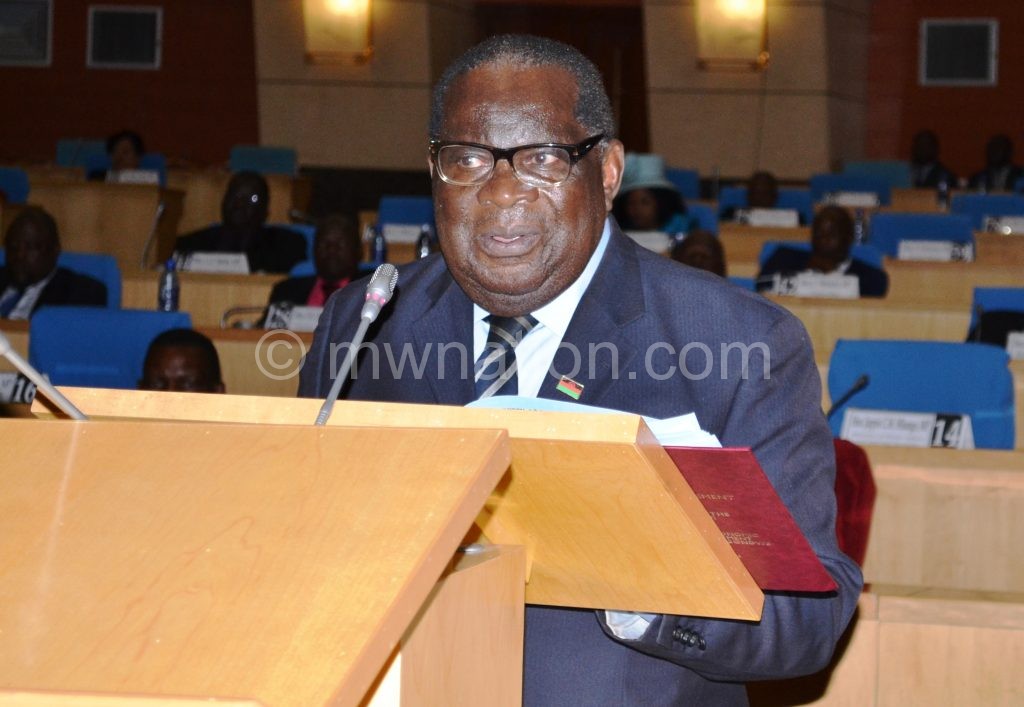Government faulted on pension law
Minister of Finance, Economic Planning and Development Goodall Gondwe’s announcement that civil servants will again not join the National Pension Scheme is in breach of the Pensions Act of 2010, a lawyer has said.
The minister made the announcement in his 2016/17 National Budget which he delivered in Parliament on Friday. He cited lack of funds as the contributing factor.

Commenting on government’s position, Blantyre-based lawyer Allan Muhome, a pension law expert and author of the book Labour Laws of Malawi, said the move contravenes the law.
He said: “As it stands, those aggrieved, the civil servants who should have benefitted through the migration, can seek redress from the court to force the government to act.”
Muhome also said the decision can be interpreted to mean that government had passed a bad law which should be amended to be in line with the prevailing economy.
He said: “The government needs to go back and admit that the economy cannot afford this [law], let’s scrap it.”
The migration would have seen government paying each civil servant their contributions to the pension fund at 10 percent of the employee’s salary and the civil servant would contribute five percent to the same, according to Section 12(1) of the Pensions Act.
Private sector employees adopted the mandatory contributory pension scheme when it came into effect in June 2011, but government was given two years to make the transition.
It was estimated that if a full migration were to take place, government would need to pay out all pension obligations.
Now, Gondwe will have to ask Parliament for additional time for the public service to join the National Pension Fund once the two years he asked for in 2014 expires on June 30 2016.
Reserve Bank of Malawi (RBM) statistics show that pension assets have grown from K59.5 billion ($83.3 million) in 2010 to K247 billion ($345.5 million) in 2014.
On the other hand, pension contributions—contributions by workers and their employers—have also grown from K5.8 billion ($8.1 million) annually in 2010 to K30.6 billion ($42.8 million) in 2016, according to the statistics.
In terms of membership, there are now 200 000 members compared to 74 000 in 2010 when the mandatory pension scheme was non-existent.
In his statement, Gondwe has proposed a K50.2 billion ($70.2 million) allocation for pensions and gratuities, which is about K9 billion ($12.6million) more than the revised allocation of K41 billion ($57.4 million).
He said: “This is only adequate to sustain payments under the existing Government Pension Scheme because of our inability to migrate to the National Pension Scheme due to resource limitations.”
In the financial year ending June 30 2016, Gondwe had announced that about 122 200 civil servants would migrate from the current pension scheme which is a defined contributory arrangement unlike the previous one where civil servants did not contribute.
But Civil Servants Trade Union (CSTU) has asked government to pay the defined pensions before concluding the migration.
“We don’t want serving civil servants to be oppressed, but also retired civil servants by not paying them their dues on time,” CSTU general secretary Madalitso Njolomole said.
Government has also failed to implement the plan to migrate civil servants to the new scheme in phases as announced in the previous budget.
The phased migration was expected to take place in three groups of civil servants with the first being serving civil servants above the age of 30 years who will have accrued pension rights before migration takes effect.
Gondwe had touted the new pension scheme as the best alternative for civil servants to save because the more an employee contributes, the more the pension would be after retirement.





